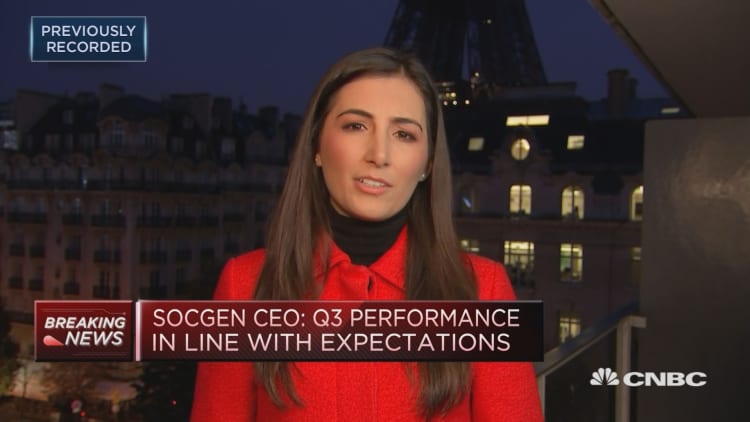
Societe Generale has reported a net income of 854 million euros ($945 million) for the third quarter of 2019, falling short of analyst expectations.
Analysts expected a net income of 863.20 million euros for the third quarter, according to Refinitiv.
The French lender posted a net income of 1.05 billion euros in the second quarter of 2019. Furthermore, it had reported a net income of 1.3 billion euros a year ago.
Here are some of the highlights for the third quarter of 2019:
- Revenues stood at 5.98 billion euros vs 6.53 billion a year ago.
- Operating expenses dropped 4.1% from a year ago to 4.17 billion euros.
- CET Tier 1 ratio reached 12.5% from 11.2% a year ago.
Societe Generale announced earlier this year plans to cut 1,600 jobs, mainly at its corporate and investment banking arm.
"Our performance is very much in line with our objectives and priorities. Our priority number one is around capital. This is the core focus of our shareholders," Frederic Oudea, chief executive officer told CNBC.
Societe Generale announced in 2017 that it would be looking to grow its capital position, towards a CET Tier 1 ratio target of 12% by 2020. Wednesday's results marked the second consecutive quarter where CET Tier 1 ratio was at 12%.
Speaking to CNBC, Oudea said that the bank is not going to revise its CET tier 1 ratio target going into 2020. Nonetheless, he said: "At the beginning of the year, there was some worry that we would not be able to meet the 12% target. We are above, it gives a cushion. People should feel pretty relaxed now."
Shares of Societe Generale moved more than 3% higher in early deals.
Investment banking still weak
Societe Generale saw a drop of 26.7% in net income at its global banking and investor solutions business during the third quarter of 2019. This was due to the sale of certain units and a lower demand for large deals.
In this context, fixed income was overall stable from a year ago, but the equities business fell 20% from a year ago. Oudea told CNBC that the French lender has not yet ripped all the benefits from closing certain business, which is only expected to improve the balance sheet at the end of 2019 and through 2020.
Looking at the other business divisions: French retail and international retail banking saw modest drops in net income in the third quarter. The former reported a net income of 311 million euros, down 2.8% from a year ago. International retail registered 513 million euros, a fall of 3.6% from a year ago.
Deal with Commerzbank
In the third quarter of 2018, Societe Generale purchased the equity markets and commodities business of Commerzbank. Societe Generale's CEO told CNBC that the integration of the business should be concluded by the end of the year.
As part of its cost reduction plan, Societe Generale announced 1600 job cuts earlier this year, through a voluntary program in its investment banking division.
Speaking to CNBC, Oudea said there could be further changes to its labor force in the French retail business. "We have just announced that we are starting a discussion on the back office for the period of 2020-2023 with our trade unions."
Shares of Societe Generale are down about 18% from a year ago.
'End' of ECB stimulus
The European Central Bank (ECB) announced further stimulus measures in September, which included another cut on already negative rates and a fresh round of quantitative easing. The central bank has embarked on a series of monetary easing measures since the wake of the sovereign debt crisis of 2011.
Speaking to CNBC, Oudea said:"I would think that we are now at the end".
"And I would say that what needs to be done in Europe is probably more action on the budget from the governments than further decrease of interest rate(s)."
Negative interest rates tend to hurt banks' balance sheets. In September, the ECB announced a tiered system of interest rates — meaning that a portion of bank deposits are exempted from an ECB charge.
According to Oudea, the tiering system "is not enough" to weather the impact of negative rates, but "it shows that the ECB pays attention to the impact of negative rates on the profitability of banks"


